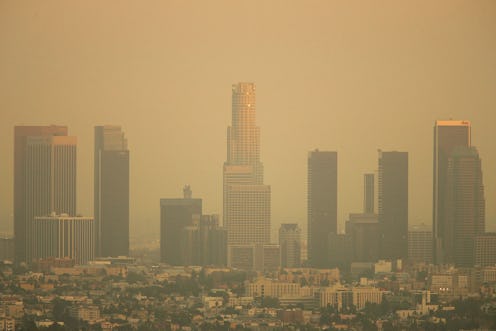News
A New Ozone Emissions Policy Will Soon Be Released
On Wednesday, the Obama administration is expected to release a new, sweeping environmental regulation that will reduce the amount of ozone released into the atmosphere. The pollutant has been linked to a number of health problems, including "asthma, heart disease and premature death," the New York Times reports. The new law would affect power plants and other industrial firms throughout the nation, but would hit hardest in the Midwest, where such factories are the most heavily concentrated. This latest move by the president is the latest in a string of environmental measures that have become a defining component of his administration.
The Times notes that lobbyists have urged Obama to take action against ozone emissions for years, and Paul Billings, a senior vice president of the American Lung Association told the publication, "Ozone is the most pervasive and widespread pollutant in the country." Consequently, many seem to believe that this is one of the biggest and most consequential decisions Obama could've reached during his second term, at least when it comes to environmental issues.
William Becker, executive director of the National Association of Clean Air Agencies, noted the hidden dangers of ozone, and joined others in applauding Obama's actions. Said Becker to the Times,
For the past several years, the public has been living with a false sense of security about whether the air they’re breathing is safe. Ozone is not only killing people, but causing tens of millions of people to get sick every day.
According to those familiar with the new legislation, "The proposed regulation would lower the current threshold for ozone pollution from 75 parts per million to a range of 65 to 70 parts per million," which is still not as strict as some environmental activists had originally hoped for. Many groups believe that 60 parts per million should serve as the cap, and remain hopeful that the final number offered by the Environmental Protection Agency could be closer to that goal.
The effects of this new law would likely be to force power plant and factory owners to utilize costly equipment in order to clean their emissions, a move that opponents of the measure say would ultimately hurt companies and manufacturers. Though the president's commitment to the environment has been applauded by some, others have looked upon legislation like the Clean Air Act as yet another example of Big Government overextending its reach and meddling in the affairs of private businesses.
Howard Feldman of the American Petroleum Institute said to the Times, "Further tightening the current ozone standards — the most stringent ozone standards ever — is a major concern because of the potential cost and impact on the economy." Challenging the assertion that ozone has had negative effects on the environment and the atmosphere, Feldman instead insisted,
Air quality has improved dramatically over the past decades, and air quality will continue to improve under the existing standards. The current review of health studies has not identified compelling evidence for more stringent standards, and current standards are protective of public health.
This statement stands in stark opposition to the opinion of Mr. Billings, who seems to provide "compelling evidence for more stringent standards" by pointing out that "ozone is linked to a wide range of serious health consequences — not just asthma, coughing, wheezing and cardiovascular diseases, but the ultimate health effect premature death."
Regardless of public health benefits (or lack thereof), Feldman also noted that many businesses have yet to comply with the regulations set forth by 2008 standards of the Bush administration, which set the ceiling at the current rate of 75 parts per million. Feldman told reporters Tuesday, "Now is not the time to move the goalposts and start trying to change the standard to an even tighter standard. We should first work on meeting the current, existing standards, before changing the standards. That makes good public policy."
Unfortunately for the American Petroleum Institute, it seems that the Obama administration is more concerned with the environmental and health risks of ozone than allowing dilatory companies to catch up with the times.
Images: Getty Images (3)
